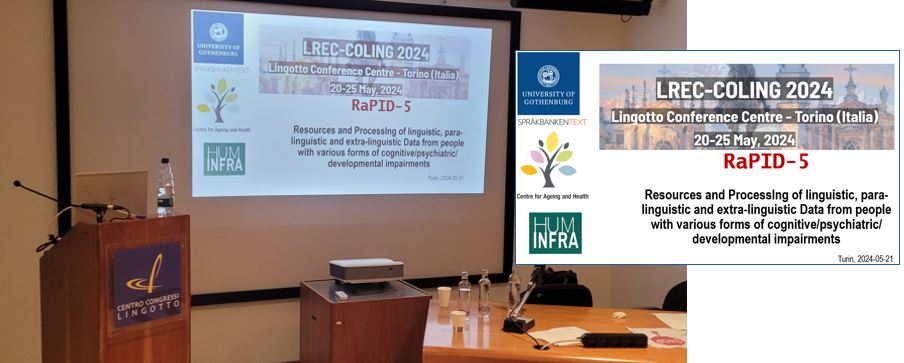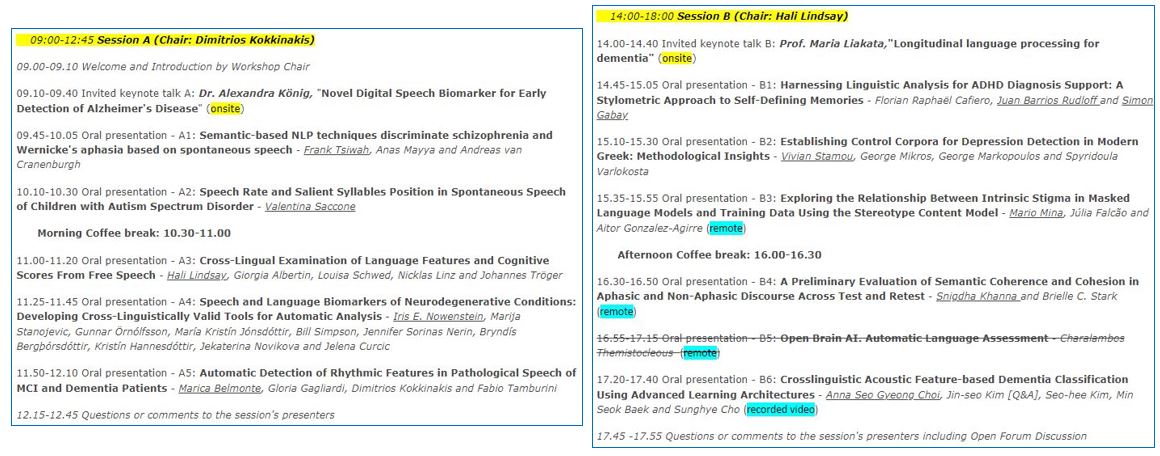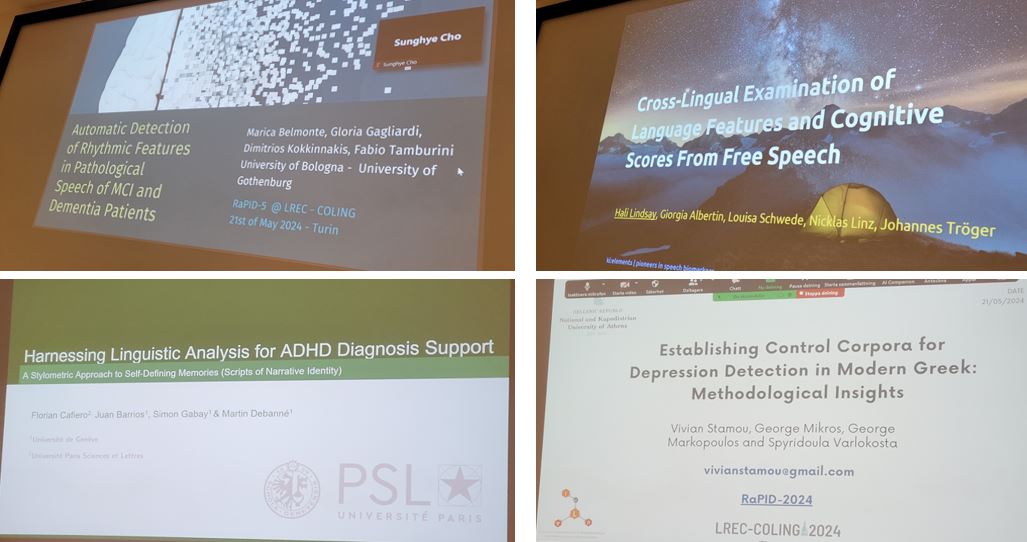Two major international key players in the area of computational linguistics, the ELRA Language Resources Association (ELRA) and the International Committee on Computational Linguistics (ICCL), joined forces to organize the 2024 Joint International Conference on Computational Linguistics, Language Resources and Evaluation (LREC-COLING 2024), held in Torino (Italy) on 20-25 May, 2024. Over 30 workshops, 13 tutorials and an exciting, memorable, and exhausting main conference set the stage for this large event - there were 1556 papers accepted (long papers, short papers, and posters).

Dimitrios Kokkinakis, as the workshop chair and representative of SBX, organised one of these workshops, namely the 5th in a series called: RaPID

RaPID-5 at a glance
RaPID-5 brought together researchers to explore how data from people with mental and brain-related conditions like dementia, autism, and Parkinson's disease can be collected and analyzed. The workshop focused on using text, speech, eye tracking, and wearable sensor data to diagnose and monitor these conditions more effectively. By examining how language is used and tracking physical measures, researchers aim to improve early diagnosis, predict who might be at risk, and enhance patient treatment. New non-invasive, cost-effective methods are being developed to complement traditional medical exams.
Computational linguistics and Natural Language Processing (NLP) are key areas of this research. Comparing data from affected individuals with healthy ones has shown promising results in early diagnosis and monitoring disease progression. Strong computational tools and data infrastructure support this work and foster collaboration among researchers. Despite progress, more research is needed to improve prediction accuracy and develop better diagnostic tests for brain and mental disorders.
Program, invited speakers and accepted papers
The two invited speakers gave inspiring talks about the latest advancements in mental health research and the innovative use of data analysis in diagnosing and monitoring cognitive impairments.
Dr. Alexandra König [Inst. national de recherche en informatique et en automatique (INRIA); Cobtek (Cognition; Behaviour; Technology) Lab; University Côte d'Azur, France and ki:elements (Germany)]. Dr König's talk "Novel Digital Speech Biomarker for Early Detection of Alzheimer's Disease" dealt with the applications of novel digital speech biomarkers for measuring cognition (SB-C) alongside its analytical and clinical validation. The SB-C algorithm demonstrates robustness in detecting Mild Cognitive Impairment (MCI) across various cohorts and languages. In addition, speech and language markers have shown to be useful in objectively assessing common neuropsychiatric symptoms in MCI, such as depression or apathy. This innovation holds the potential to enhance the efficiency of ongoing trials and augment future primary healthcare practices concerning AD. Identifying subtle cognitive as well as affective changes through speech analysis signifies a critical advancement in the pursuit of early AD detection, potentially transforming the landscape of AD research and clinical interventions.
Prof. Maria Liakata [EPSRC/UKRI Turing Institute AI fellow, Queen Mary University of London, UK] talk was about "Longitudinal language processing for dementia". Prof. Liakata's talk dealt on the use of Large Language Models (LLMs) which has brought great promise to the field of AI. Prof. Liakata outlined many unresolved challenges, especially around appropriate generation, temporal robustness, temporal and other reasoning, and privacy concerns, particularly when working with sensitive content such as mental health data. Her talk consisted of three core research directions: (1) data representation and generation, (2) methods for personalized longitudinal models and temporal understanding, and (3) evaluation in real-world settings, with a focus on mental health and particularly on longitudinal monitoring for dementia.

The two sessions of the workshop included oral presentations on various aspects of mental health and neurodegenerative and neuropsychiatric impairments. For more details of the workshop, including a preprint of the proceedings can be found here.


About Turin...
Turin, known as Torino in Italian, is a vibrant city nestled in the northern region of Italy, famed for its rich history, cultural heritage, and industrial prowess. As the capital of the Piedmont region, Turin boasts a stunning array of baroque architecture, grand boulevards, and historic palaces, with the Mole Antonelliana standing tall as its iconic symbol. The city is renowned for its pivotal role in Italy's automotive industry, being the headquarters of Fiat. Turin's culinary scene is equally impressive, celebrated for its chocolate, coffee, and the traditional Piedmontese cuisine. Moreover, the city holds a significant place in Italy's cultural landscape, housing world-class museums like the Egyptian Museum and the National Cinema Museum. Turin's historical significance is also marked by its status as the first capital of unified Italy in 1861, adding to its allure as a city that beautifully marries tradition with innovation.



